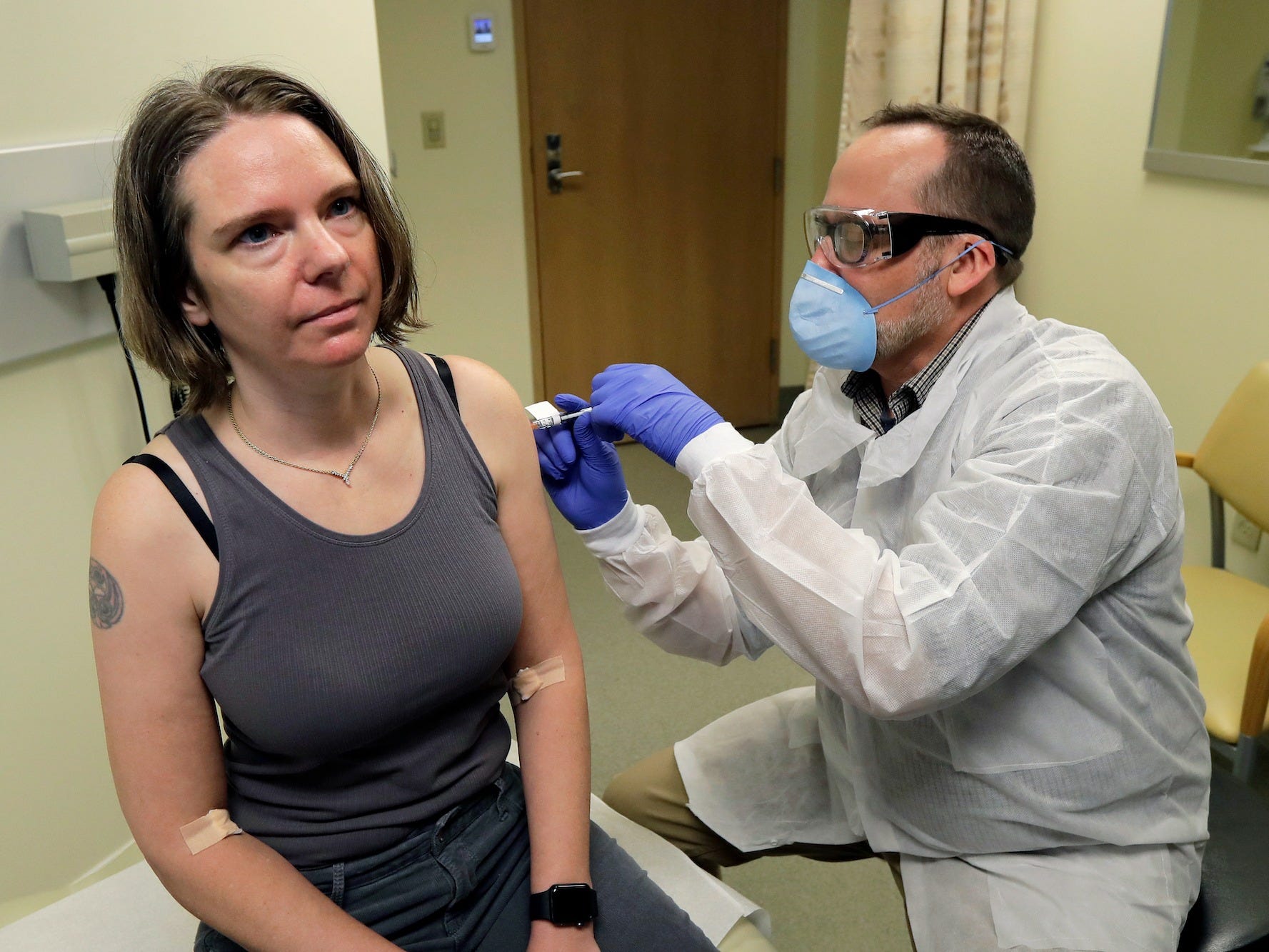- Moderna released the first human results from its coronavirus vaccine candidate on Monday.
- In a small number of healthy volunteers, Moderna’s vaccine helped create immune responses that may help protect people from being infected with the novel coronavirus.
- The biotech is planning to start additional trials immediately and is aiming to be ready this fall for potential emergency use of its vaccine.
- Visit Business Insider’s homepage for more stories.
In a milestone moment in the race for a coronavirus vaccine, the first results in humans showed Moderna’s vaccine candidate led to antibody responses in a handful of healthy volunteers.
The Massachusetts biotech described Monday the immune system responses to the vaccine from this first, small study that was primarily focused on safety. The results don’t yet show whether the vaccine would prevent people from being infected with the novel coronavirus.
Finding an effective coronavirus vaccine has become a global priority in ending the pandemic. US government leaders have put forward the ambitious timeline to have one by the end of 2020. It typically takes several years to develop a vaccine.
The trial was conducted by the US National Institutes of Health. Moderna is planning to soon start a mid-stage study and then begin a late-stage trial in July. The company is aiming to be ready for potential emergency use of its vaccine this fall, a timeline with no precedent in the history of vaccine development.
Moderna has worked closely with the NIH since early January on its coronavirus vaccine, dubbed mRNA-1273. The biotech uses a technology platform called messenger RNA (mRNA) to create vaccine candidates using solely the genetic code of the virus. Traditional vaccines typically require live samples of the virus.
While mRNA has demonstrated its speed, with Moderna being the first to enter the clinic and now the first to release human results, it has never led to an approved vaccine. The Cambridge, Massachusetts biotech is now hoping its coronavirus vaccine can be its first, eyeing full regulatory approval in 2021.
Investors cheered the initial results Monday morning, sending Moderna's stock up nearly 30%. The biotech already has seen its shares more than triple since the beginning of 2020, as it has advanced its vaccine. Moderna has a market value of about $28 billion.
Vaccinated volunteers developed antibody responses against the coronavirus
This trial enrolled 45 healthy volunteers to start, ages between 18 and 55 years old and randomly gave one of three dose strengths for two shots: 25 micrograms, 100 micrograms and 250 micrograms.
All participants developed detectable antibodies, and Moderna said there were "dose dependent increases in immunogenicity" across the three potencies.
Antibodies are virus-fighting proteins that play a critical role in human immune responses. A critical unknown is how many antibodies do people need to be protected from the virus, but Moderna executives said these early results suggest they are on the right track.
"I think the totality of science tells us that this is the right antigen and it should be protective," said Tal Zaks, Moderna's chief medical officer, on a Monday call to discuss the results.
Researchers have focused on neutralizing antibodies, in particular. These antibodies can stop the virus from hijacking healthy cells and replicating itself. Zaks said there's "a clear linear correlation between total binding antibodies and neutralizing."
"As I look forward, I think this data today takes off the table the risk of not being immunogenic or the risk of the antibody type being wrong," Zaks later added. "No, it works, and you see demonstration of neutralizing activity."
The 15 volunteers at the weakest dose strength also had antibodies in their blood at similar levels to people who recovered from COVID-19, after receiving both doses.
Follow-up data was more limited for the higher doses, as the volunteers are still being tracked. Ten people given both 100-microgram doses with sufficient follow-up had antibody levels that "exceeded the levels seen in convalescent sera."
Moderna also said they had data specifically on neutralizing antibodies for eight people. All these volunteers showed neutralizing antibodies "at or above levels generally seen in convalescent sera."
The company also said the NIH has helped test the vaccine in mice. After being vaccinated, mice were exposed to the novel coronavirus. Moderna said the vaccine "prevented viral replication in the lungs" of these mice. Additionally, these early human data on levels of neutralizing antibodies were consistent with the mice data.
The vaccine was "generally safe and well tolerated," Moderna said. The company noted that at the highest dose level, 250 micrograms, three people have had severe but not life-threatening side effects. "All adverse events have been transient and self-resolving," the company noted, without further describing these side effects in the high-dose arm.
